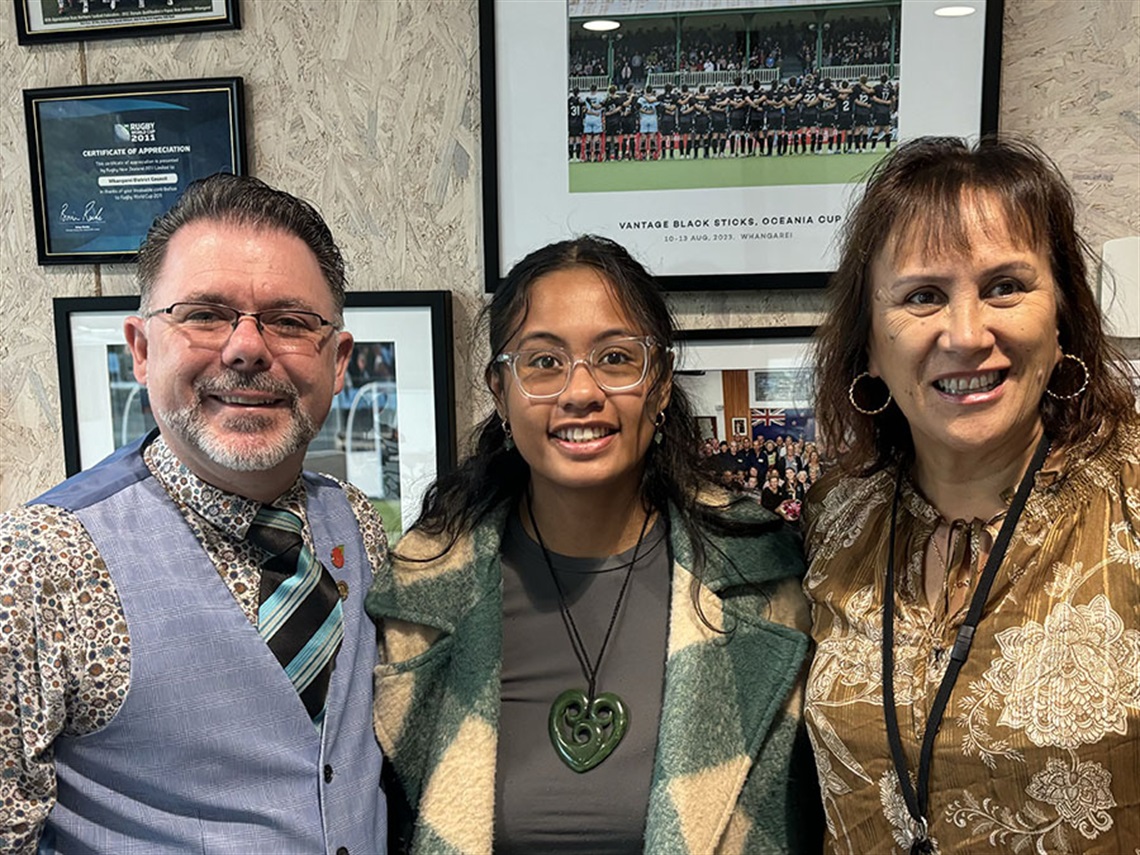The Tuia kaupapa: A Māori way of learning and connecting
Published on 09 July 2024

Mayor Vince Cocurullo, Te Rauaroha Tuhoro and Councillor Deb Harding.
Te Rauaroha Tuhoro is the Whangārei candidate selected for the 2024 Tuia Programme, a leadership mentoring programme run with local mayors. This is the story of her experience of the Tuia Programme, told in her own words.
Read more about the Tuia Programme (The Mayors Taskforce for Jobs)
By Te Rauaroha Tuhoro
The Tuia Programme involves local mayors selecting young Māori from their district to mentor on a one-to-one basis, to encourage and enhance leadership skills.
My name is Te Rauaroha Tuhoro, he uri nō Patuharakeke ānō hoki he mokopuna o Matua te mana. I grew up in Ruakākā and carried out all my schooling in Whangārei. I currently live in Te Whanganui a Tara working as a policy analyst.
My passion has always been with my hapū and my whenua. I’m always conscious of the impacts and challenges my whānau are facing back home and I’m proud of the mahi my hapū do for our whenua and community. My big ‘why’ for doing anything is my people and my home, always.
I had heard of a few tuakana who had done the Tuia Programme and a few of my friends had done it here in Te Whanganui a Tara. For the Wellington Council, I thought it was cool kaupapa, but I wouldn’t want to do it for anywhere else apart from the community I grew up in. So that’s why I sent the email to Whangarei District Council to ask about the programme and whether they would consider pursuing this kaupapa with me.
It’s been an awesome experience. It’s taught me a lot and it’s allowed for a lot of opportunities to connect with people I’d never connect with. I’m really appreciative of Councillor Deb Harding and Mayor Vince Cocurullo for their teachings, and the relationship we’re forming throughout this experience, as well as connecting with other rangatahi who are all passionate about their community and doing mahi for their people.
My most valuable takeaway is meeting all these people and making these connections – it’s opened my world. I’ve enjoyed getting the chance to talk with other rangatahi and learn what they’re doing in their communities and what’s working for them and bringing some of that learning back home, to use that kaupapa, to benefit Whangārei.
This programme is definitely something I would recommend, just because it’s a very Māori way of learning and connecting. I feel like a lot of rangatahi suffer from tall-poppy syndrome – they feel like they’re not valuable enough or talented enough to join a programme like this. They need to know there’s value in their whakaaro, whether they’ve dropped out of university or whatever their life path is, rangatahi need to know there’s value in your whakaaro no matter what your path or history has been.
If you are passionate about your whānau or your home or just learning, then your voice matters. It would be important for rangatahi who feel they’re not good enough to represent council, to be a part of this programme. I think we need to build confidence in rangatahi – it’s not about qualifications, it’s about passion.
Next steps
In the short term, Hollie, Alyssa and I (āku whanaunga), with the support of our hapū, are creating a rangatahi wānanga. I want to draw out the aspirations of my community for their home, draw up a strategy for succession and put together some steps for the future.
I've always been conscious that my hapū are in a period of regrowth - we've lost a lot as a result of many factors and it's impacted our identity as a hapū. I hope that through these wānanga we start finding pathways to connect back to our whakapapa and taiao, our connection to te ao Māori through the lens of Patuharakeke.